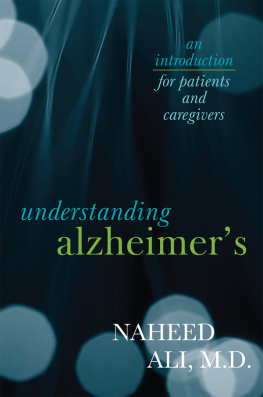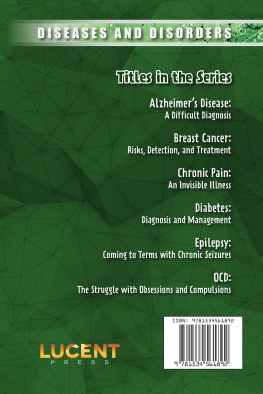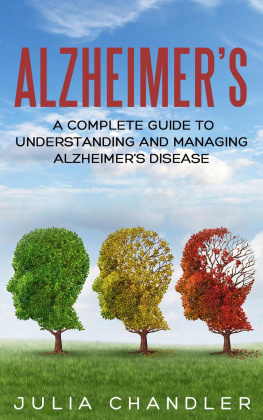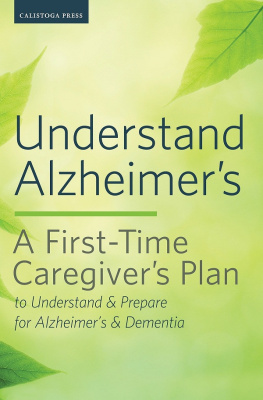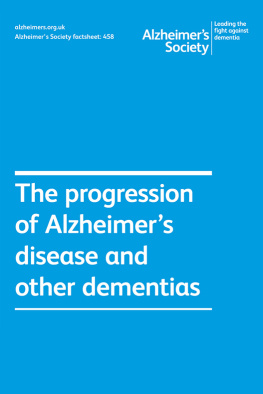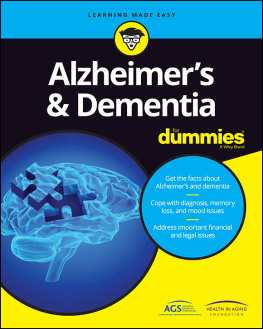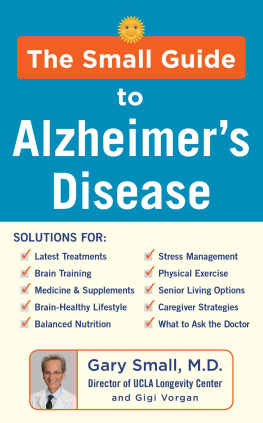
The
Spectrum of Hope
An Optimistic and New Approach to
Alzheimers Disease And other dementias

Gayatri Devi, MD
Workman Publishing
New York
Introduction
A New Perspective on Alzheimers Disease

I feel like I am being completely controlled, said my 78-year-old patient Mary, a retired college professor with a brunette bob that neatly framed her dark eyes. She looked sadly at me, adding, What I say makes no difference. Every aspect of my life is being managed. What is the point of living if things are going to go on like this?
Her mood that day was very different from when Id last seen her. What had happened in the interim? I soon found out. Her ophthalmologist, at the behest of Marys daughters, had told her to stop driving.
Her vision isnt good anymore, said one of Marys daughters, who had accompanied her mother to my office. And Dr. Smith felt that Mom wasnt safe behind the wheel.
But my eyesight hasnt changed in ten years, Mary shot back. Ive had the same prescription since before your father died!
Her daughter gave me that look that I have come to know so well, the Its the dementia speaking; ignore whats being said look. Its a look that I see daily on the faces of caregivers when patients assert that they are still working at the job they retired from years ago, when they insist they havent had breakfast that morning, when they say that their children have stopped calling.
Its easy for me to recognize the look, and patients themselves quickly become aware of it as well. Not surprisingly, they are angry when their views, regardless of how erroneous they may be, are dismissed.
Dont you give her that look! Mary said, catching her daughter in the act. You girls are treating me like I am a child. I am not a child, and I refuse to be treated like one!
Mary turned back to me. He acted like I was not in the room, she said, referring to her ophthalmologist. He talked to my girls like I wasnt even there. His behavior was simply unacceptable. No one can keep me from driving. I want my car back. There is nothing that suddenly went so wrong with my vision that I cant drive.
In this case, it wasnt my patients vision that prompted taking away the car keysit was her dementia. Marys daughters had asked the ophthalmologist to tell Mary her vision was impaired to keep her from driving.
Mary was the unwitting victim of the medical professions difficulty understanding the variability characteristic of Alzheimers disease. Having worked in the field of neurology and dementia for more than twenty years, I believe more and more that Alzheimers is not a single disease entity, but rather a spectrum disorder that presents with different symptoms, progresses differently, and responds differently to treatment, with different prognoses, for each person. Marys Alzheimers was different from the Alzheimers that affected Jack or Jill or Mike, just as Susans stroke was different from Sams. Post-stroke, Susan may be able to drive but unable to speak, whereas Sam may be able to give a toast at the Friars Club but needs crutches to get up to do so. Alzheimers too affects different parts of the brain in different people, despite the fact that almost everyone with the disease eventually develops significant memory problems. So Marys driving skills may have been unaffected by her Alzheimers even though she may have trouble finding words. And Jack may have had some fender benders as the result of his Alzheimers, despite remaining the life of the party. Jills Alzheimers may progress rapidly and aggressively, while Mikes might progress slowly.
Unfortunately, the differences between the various subcategories of Alzheimers are lost when patients get tossed into the general diagnostic inbox. Although some patients with Alzheimers become completely immobilized, most patients on the spectrum are living in the community, babysitting a grandchild, finishing up chores, or possibly even running for president of the United States (as we will read later). However, because Alzheimers is still a poorly understood disease and because ones recall bias tends toward severe cases, the people we remember with the condition are often mute and using a wheelchair, suffering from advanced illness. When we think about the condition, we will not recall the absentminded storekeeper or the lawyer who did a good job with cross-examining the witness on the stand. We have not yet learned to associate Alzheimers disease with functioning individuals, although this is, in fact, the majority of patients.
Time and again, patients and caregivers who are worried about the potential ravages of Alzheimers or another form of dementia make decisions based on fear or emotion, rather than on facts. Ive come to realize that it is not only patients and family who react in this manner to a diagnosis of dementiaphysicians and other health caregivers do too. I have been as guilty of this as anyone else. Patients themselves, confused and unsure about what to expect, may decide to fold up their lives like used notebooks and file themselves away. In allowing this to happen, we are doing ourselves and society a disservice, depriving patients with dementia and their communities of years of fulfillment, pleasure, and purpose-driven lives.
As I mentioned, I view Alzheimers as a spectrum disorder. Furthermore, Alzheimers is a multifactorial disease, which means that there can be many reasons that someone develops symptoms. In some cases, genetics may play a role, but lifestyle choices and myriad other factors can also lead to the condition. That one of a set of identical twins can get Alzheimers while the other stays healthy is testament to this fact.
Because so many factors can contribute to a person developing symptomsand because Alzheimers presents differently in each personI believe in a treatment approach that is tailored to the person and the subtype of disease they have. One size does not fit all for diabetes or strokes, which are other multifactorial illnesses, and one size does not fit all for Alzheimers.
In the sixteen chapters that follow, I address a variety of common issues that come up in the care of patients with Alzheimers and other dementias and attempt to answer the many poignant questions that I have been asked over the years.
Should I tell my family and friends about my diagnosis? a grandfather of four asks.
I love what I do! Can I keep working? asks a surgeon.
Can I stay in my apartment? Or do I have to move into a home? wonders an 80-year-old woman without any family.
Should my children take over my finances? asks the meticulous accountant.
Who says I cant drive? asks Mary.
If its not safe for Mom to drive, how can I tell her in a way that doesnt break her spirit? Marys daughter asks.
Alan has become paranoid, his wife tells me. He thinks I am stealing his money. Why would I do that after forty years of marriage? It makes me so sad that he would think that! What should I do?
She screams when she gets into the shower, and it breaks my heart, a concerned husband says.
He doesnt think he has any problems with his memory. He wont go to the doctor! a son says in frustration.
Sally keeps asking to go home, even though we are at home, Ed says.
The questions and concerns are endless. I try to be prepared with answers wrought from science and experience.
Next page


